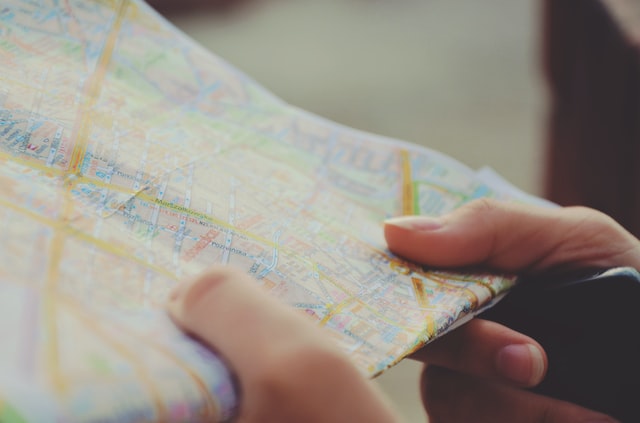People stricken with wanderlust want to see the world, meet new people, and have amazing adventures they could never find back home.
Although some people are experts at reading maps from traveling so often, not everyone has a reliable sense of direction or the skill to ask for help in a foreign land.
For that reason and others that we’ll discuss, it’s a good idea to use geolocation and GPS during your travels.
Contents
GPS and Geolocation – What Is It and How It Works While Traveling
Although they are sometimes used interchangeably, GPS and geolocation are actually different forms of technology.
The more familiar of the two is probably GPS, an initialism for Global Positioning System.
Systems that use GPS are communicating with an array of satellites in orbit around the planet by using receivers and ground stations, triangulating one’s position anywhere in the world.
Geolocation does something similar by tracking someone’s position relative to Wi-Fi networks and mobile phone communication towers.
As you can see, this could work in just about any country as the majority have one outcome or the other available in their territory.
Why is GPS Tracking Interesting for Travelers?
The question must be asked, why is GPS so interesting for travelers?
The most obvious answer is so that you know where you’re at in a specific country.
If you’re trying to get to a certain destination, a GPS or geolocation system can help you see where you’re at and plot a route to the area you mean to go.
Travelers know that GPS can be helpful in other ways, too.
Imagine that you are staying in a large city for a while and you want someone to keep you company, go on dates with you, and see the sights.
This is especially true for single gay men who often do not want to draw too much attention to themselves in a foreign country, but still crave communication, so they turn to online dating.
A dating site’s GPS can help you answer many questions about finding a partner near your travel destination.
How to find local dates?
How to seed suitable gay dating seekers?
Where can I find men seeking men near me?
A dating site comes in handy in solving all of these issues.
The website will help connect you with partners, and the GPS can help you find men within a few miles of your location no matter where you’re at in the world today.
That is quite an incredible benefit when you’re seeking some company.
Of course, GPS has other benefits, too.
Imagine that your primary form of transportation falls through, so you have to take a bus instead of a train.
Well, where’s the nearest bus station in Berlin and how do you get there?
Your GPS tracking system can help put you on the right path.
You should also keep a GPS on your mobile device for other, less glamorous reasons.
You might want to find nightclubs, landmarks, or the homes of relatives in unfamiliar settings.
Geolocation and GPS instantly solve that problem when combined with mapping apps and websites.
Some people insist that you should not use GPS when you travel.
They think you should put more effort into engaging the locals in conversation and look for the hidden gems in the places you travel.
While that might be fun to try, it won’t help you in a situation where you need to stick to the main hubs in town to remain safe.
Talk with locals, but don’t always rely on them to point you in the right direction.
How Location-Based Technology Makes Traveling Safer
Staying safe while on a journey is something that every traveler has to bear in mind.
A momentary lapse in judgment can leave you open to minor aggravations like being stuck in a bus station overnight or to an unsafe area where you can be harmed.
Certain minority groups have more trouble than others when traveling, and it’s important to use whatever technology they have on hand to mitigate those threats.
For example, gay men might want to consult a travel guide to see which parts of what cities are safe for them in various countries.
Lyon, France, is a very safe city, but the same can’t be said for Nimes or places where people are more conservative in their views toward LGBT people.
Digital travel guides can help gay men find friendly places in cities where they can seek shelter after a negative experience, too.
Location-based technology can promote safety in other ways, too.
Apps that use Geolocation or GPS to track a person’s phone can be used to find them in the event of an emergency.
Many hikers have been saved from dire situations because they kept their GPS signal active, and emergency services found them before harm could befall them.
Conclusion
Location-based technology is playing a larger role in our collective lives.
Nowadays, people can use GPS and geolocation to help them find romantic partners while they’re on location, see unique landmarks while on vacation, and even find the best mode of transportation when they would otherwise be lost.
Combined with travel guides and translation apps, location-based tech is poised to have a profound, positive impact on people now and in the future.











